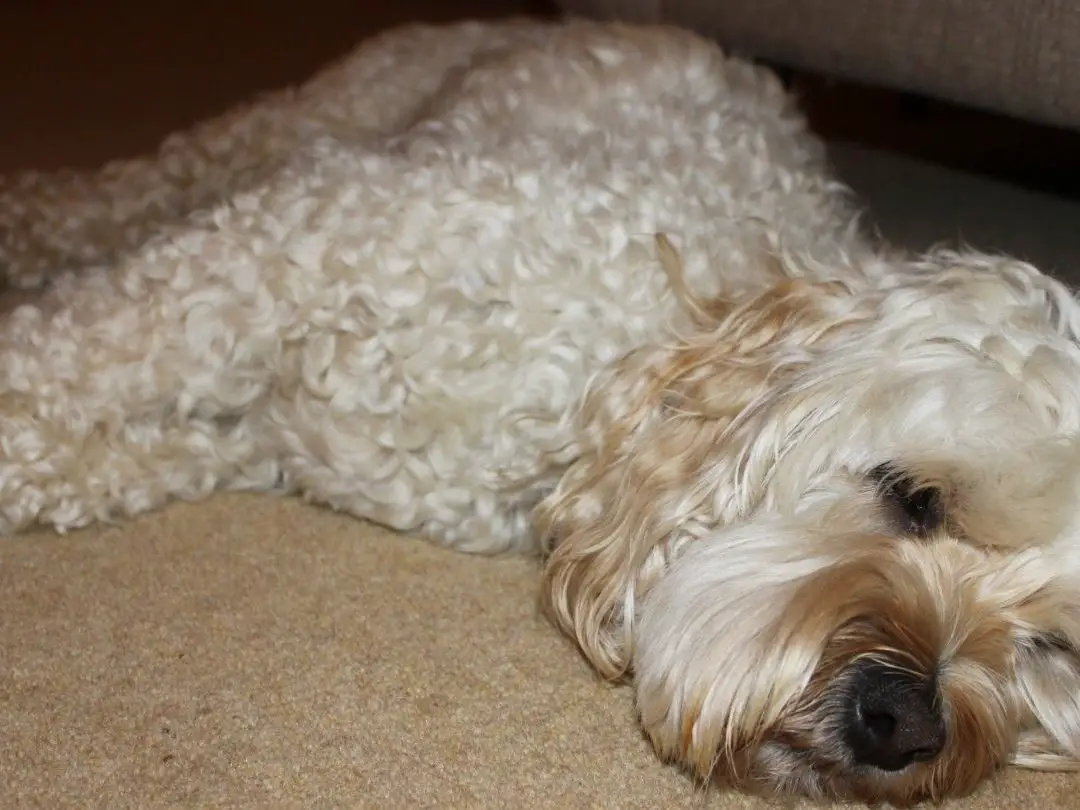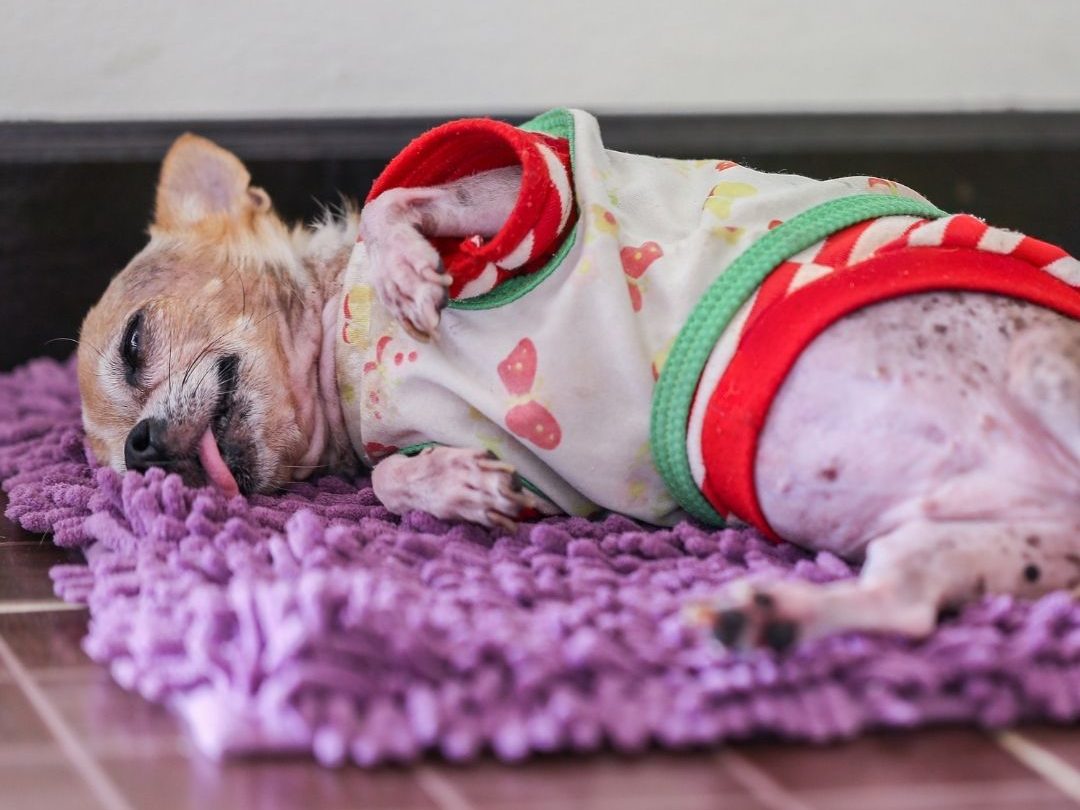Did you notice your dog in an awkward position while getting a glass of water at 3 am? If you’re feeling puzzled by your pup’s quirky night-time behavior, read on to know: Can Dogs Sleepwalk?
If you’ve had a furry friend for a while now, you might have seen him make little twitching motions or lurching in their sleep, as if acting out their doggie dream. Both clinical reasons and typical behavioral displays help explain your dog’s curious ways.
Can Dogs Sleepwalk?

Dogs cannot sleepwalk. While they may have the ability to dream, twitch and perform other actions while they sleep, your dog certainly cannot sleepwalk.
What might appear as a sleepwalking dog is possibly disorientation due to neurological decline in your older dog. A sleepwalking episode may also be the after-effects of a night terror: your dog may be pacing to show his anxiety and fear.
Can Dogs Sleepwalk With Their Eyes Open?
Since dogs cannot sleepwalk, they cannot sleepwalk even with their eyes open.
It might be strange to see your canine companion snoring away with their eyes still open. But, it is completely normal for your dog to sleep with his eyes open.
However, if your dog has trouble sleeping through the night, is sleep deprived, or shows signs of sleep apnea, it’s best to consult with your veterinarian, who may prescribe sleep medication.
Confusional arousal is a sleep disorder predominantly affecting humans. However, it is not uncommon in dogs. This disorder causes the victim to act in a strange and confused way as they wake up or just after waking and can worsen if the dog is forced awake and even cause seizures.
Do Dogs Sleepwalk And Pee?
Dogs cannot sleepwalk and pee.
One of the most common reasons why dogs pee in their sleep is incontinence or lack of voluntary control over urination or defecation.
Your dog’s night-time wandering might simply be the result of excess fluid intake or a more serious sleep disorder like REM(Rapid Eye Movement) behavior disorder.
Why Do Dogs Sleepwalk?

Dogs do not sleepwalk; if you notice similar behavior, it might indicate sleep problems, cognitive decline in old dogs or night terrors. Here are some of the most common misnomers for dog sleepwalking:
1. Sleep Disorders
Sleep disorders, neurological disorders, and cognitive disorders in dogs are often mistaken for sleepwalking. Behaviors such as twitching, pawing the ground, and lurching while asleep may indicate other problems.
2. Sleep Apnea
Sleep apnea in adult dogs is rare, but flat-faced breeds like pugs and terriers as well as obese dogs are at higher risk.
Guide dogs and breeds like English Bulldogs, Boston Terriers, and Pugs are more prone to have excessive internal fat or abnormal respiratory anatomy. Their small snouts and airways can temporarily collapse or narrow the airway to cause this obstructive sleep apnea and can jolt the dog awake for 10 to 20 seconds at a time.
3. Insomnia
Your dog may simply be suffering from insomnia. It’s important to consult with a veterinarian or sleep specialist for any sleep-related disorders in your dog because they are often the most difficult to brave through.
You can also treat their insomnia by putting on some relaxing dog music that can help them fall asleep.
Can Dogs Sleep Talk?
Dogs’ whimpers and whines may resemble the dozy ramblings of their human caretakers: this is their sleep “talk.” They may be unconsciously responding to their dreams.
Dogs can sleep “talk” only when they are in a deep sleep. This is the REM (Rapid Eye Movement) cycle, and should not be disturbed.
Sleep “talking” is often accompanied by symptoms such as twitching, panting, or sudden, jerking movements that indicate sleep terrors.
What To Do If Your Dog Sleepwalks?
Since your dog cannot sleepwalk, his strange behavior that resembles sleepwalking most likely requires clinical treatment. Watch out for the signs and course of action for your dog below:
1. Excessive Twitching
A twitching limb by your dog might be a muscle injury. Whining and pawing at the ground might be a night terror.
If you feel like there’s something off about your dog’s night-time behavior, contact your veterinarian and get him checked out.

2. Random and Jerky Movements
More often than not, your dog’s random and jerky movements are typical. But if the strange behavior makes you believe it might be symptomatic of something larger, it’s time to call your veterinarian.
3. Sleep Disorders
Study your puppy’s body language. If it appears anxiety-ridden and fearful, your dog may be suffering from psychological or sleep disorders.
Why Do Dogs Scream In Their Sleep?
If your dog exhibits violent behaviors while sound asleep–– screaming or whining helplessly–– he could be suffering from a REM (Rapid Eye Movement) sleep disorder.
Typically, dogs enter REM sleep about 20 to 30 minutes into a sleep session and might stay there for about 2 or 3 minutes. If you observe him closely, you might notice the puppy’s breathing become irregular and shaky. In young dogs and senior dogs, the muscles might twitch and tremble.
Violent motor activities like screaming and subsequent complex behaviors emerging in dogs during REM (Rapid Eye Movement) sleep result from a REM sleep behavior disorder. Other clinical signs include loud barking, howling, growling, and chewing. This disorder can affect your dog both at night and during daytime naps.
Should I Wake My Dog If He Having A Nightmare?
It’s best to leave your pooch sleeping if he’s having a nightmare.
Most of your dog’s dreams take place during the REM (Rapid Eye Movement) cycle. Like in humans, disrupting this cycle, to soothe a nightmare or otherwise, can be dangerous for your dog’s circadian rhythm and can have other serious consequences.

Instead of interrupting the REM cycle, you can allow your dog to sleep through the nightmare and comfort him with affection petting after the sleep terrors have passed.
Gently speaking to him and letting him sleep close to you will also tremendously relax your pup, especially if he faced traumatic experiences as a young dog.
Is It Ok To Wake A Dreaming Dog?
Dogs can dream, and pet owners should refrain from waking a dreaming dog.
Dreams often occur during the REM (Rapid Eye Movement) cycle, which, when disturbed, can cause sleep deprivation, restlessness, behavioral changes, aggression, biting, and premature cognitive deterioration in your dog.
Interrupted sleep patterns at night can also cause excessive daytime sleepiness which can be harmful for your dog.

Dogs and dog owners experience REM (Rapid Eye Movement) and NREM (Non-Rapid Eye Movement) sleep in the same way. Since we spend only 10% of our sleep in this stage, it is crucial for memory as well as cognition and must be protected.
Slow-wave sleep (SWS) is the first phase of NREM sleep, where mental processes have slowed, but the body’s still awake. Dogs and humans alike can be woken in this initial stage of sleep without harmful consequences.
Can Dogs Wet Themselves In Their Sleep?
Dogs can wet themselves in their sleep due to various reasons like bladder stones, urinary tract infections, etc. This condition is found in many dogs, especially neutered dogs.
Most female dogs, often unconsciously, urinate a few drops in their sleep. It is enough to wet the dog’s fur, but not the bedding. It’s best to change the bedding anyway because it can make your dog more prone to urinary tract infections.
Besides these, dogs can also wet themselves in response to a bad dream or a sleep terror. You may want to use a pee pad to secure their bed.
Also Read: The Best Crate Pads For Your Dog
What Do Dogs Have Bad Dreams About?
If your dog is whining, whimpering, or growling, then he may be having a bad dream in which he feels threatened or anxious.
Unfortunately, your dog can have nightmares. Dogs can’t construct frightful monsters in their imagination. If your dog is experiencing a night terror, it’s likely the recollection of a past traumatic experience.
By making your dog’s environment more soothing and relaxed, you can help ease his frequent night terrors. A comfy bed like No products found. eases anxieties during their sleep.
Also Read: Best Chew Proof Blankets For Your Dog
How Do You Know If Your Dog Is Having A Bad Dream?
Study your dog’s body language while he’s asleep to know if he’s experiencing a bad dream.
Some signs that indicate nightmares experienced by your dog include weak whining or whimpering, panting, tense jaw, and twitching whiskers.
Do Dogs Dream About Their Owners?
Since most dogs are extremely attached to their owners, they’re likely to dream about them, too. An evolutionary psychologist from Harvard Medical School has confirmed this.
Some dogs paddle or twitch their legs and make general noises of joy and excitement. Maybe they’re experiencing a good dream about dinner!
Do Dogs Like Being Pet While Sleeping?

Avoid petting or stroking your dog while he’s sleeping. If you pet your puppy while he’s sleeping, he might jerk awake if the action is unexpected.
Unexpected or unfamiliar touching can make your dog upset or aggressive. Your pupper may even end up biting you or growling at you.
That said, petting your dog when he’s awake and playful or sleepy is a great way to establish a close and intimate bond. Repeated petting, especially behind the ears, relaxes your furry friend and can lull him to sleep.
Do Dogs Know When Their Bedtime?
Because of their circadian rhythms, dogs are sensitive to day and night. They are conscious of their bedtimes and nap times. Your dog might even be conscious of your sleep patterns!
They may also have a sense of certain other times of the day. Your dog may know when lunchtime is approaching, what time you typically go for a run in the dog park, etc.
Conclusion: Can Dogs Sleepwalk?
So, the answer to Can Dogs Sleepwalk? Is that they cannot, at least not in the way humans do. They will not move around in a coordinated way that resembles ‘awake’ behavior. If you suspect that your dog is a sleepwalker, it is most likely not so.
Rather, his behavior may be the result of insomnia, lethargy due to a lack of physical activity, or cognitive decline.
If you catch any unusual symptoms like restlessness and anxious panting, consult with your veterinarian, who can put you in touch with a canine sleep specialist.





